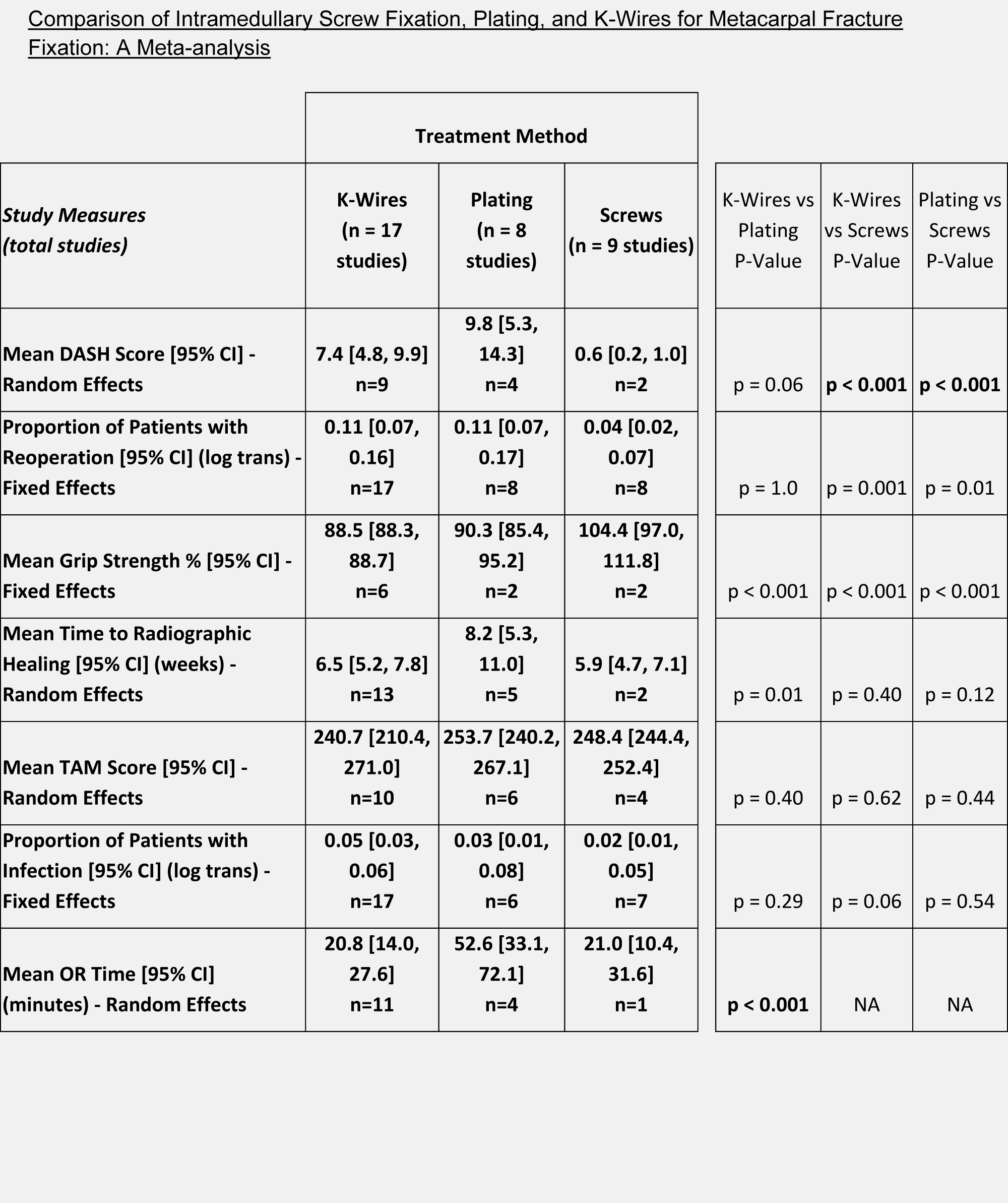Comparison of Intramedullary Screw Fixation, Plating, and K-Wires for Metacarpal Fracture Fixation: A Meta-analysis
John Chao1, Christina DelPrete2, Bobby Varghese3, Corrin Trerotola3, Hari Iyer3, Ajul Shah3
1Rutgers-NJMS,Newark, NJ; 2Rutgers-RWJ, New Brunswick, NJ; 3The Plastic Surgery Center, Shresbury, NJ
Background: Metacarpal fractures are common injuries with multiple options for fixation. We hypothesize that intramedullary screw fixation (IMF) of metacarpalfractures offers improved outcomes, including DASH score, total active motion (TAM), grip strength, and decreased rates of reoperation or infection, when compared to k-wire and plate/screw fixation.
Methods: A systematic literature review using the MEDLINE Database was performed for studies investigating metacarpal fractures treated with IMF, plates/screw, or K-wires. We identified nine studies using IMF, eight using plates/screws, and 17 using K-wires. A meta-analysis using random or fixed effects models was performed to calculate pooled effect size estimates, controlling for heterogeneity between studies. Outcome measures included mean DASH scores, mean TAM, mean grip strength (percentage to contralateral), mean time to radiographic healing, and the proportion of patients with infection and re-operation.
Results: Patients with IMF of metacarpal fractures had significantly lower mean DASH scores at an average of 0.6 [95% CI: 0.2, 1.0] compared to both Kwires (7.4 [4.8, 9.9]) and plates/screws (9.8 [5.3, 14.3]) (both p<0.001). IMF also had significantly lower rates of reoperation at 4% [2%, 7%], compared to K-wires (11% [7%, 16%], p= 0.001) and plate/screw fixation (11% [0.07, 0.17] p=0.01). Grip strength was significantly higher in IMF (104.4% [97.0, 111.8]) compared to K-wires (88.5%, [88.3, 88.7]) and plate/screws (90.3%,[85.4, 95.2] (both p<0.001). There were no statistically significant differences in time to radiographic healing of evidence, mean TAM, or ratesof infection. Mean OR time was similar between IMF (average of 21.0 minutes [10.4, 31.6]) and K-wires (20.8 minutes [14.0, 27.6]), but both were shorter compared to plate/screw fixation (average 52.6 minutes [33.1, 72.1]) with K wires being significantly shorter (p<0.001).
Conclusions: This meta-analysis compares outcomes of metacarpal fixation with intramedullary screws, K-wires, or plates/screws. IMF provided statistically significant lower DASH scores, higher grip strength, lower rates of re-operation when compared to K-wires and plates/screws for fixation of metacarpal fractures. There were no statistically significant differences in rates of mean TAM, time to radiographic healing, or rates of infection between the 3 groups. OR time was lower for both IMF and K wires as compared to plates and screws,but only K wires had enough data points for significance.
Back to 2022 Abstracts

